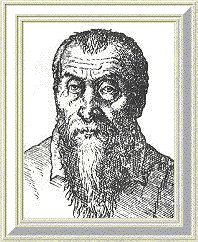 Although
relatively under-appreciated today, Willaert was one of the most
dynamic
and influential composers of the mid-16th
century. Born in the Netherlands, he spent the majority of his career
in Venice as Maestro di Cappella. Little needs to be said about
the subsequent musical history of Venice, featuring such figures as Gabrieli
and Monteverdi, but it must be emphasized
that this development started quite clearly with Willaert's arrival. He
wrote
in nearly every genre of the time, from the motet
to the madrigal,
chanson,
villanella, frottola and on
to the instrumental ricercar.
He was a pioneer of abstract instrumental music,
and with it much of the Venetian
style of the next century, including the polychoral
disposition which he also pioneered in sacred music. He even made early
contributions to the new monody in the form of his madrigal transcriptions.
Although
relatively under-appreciated today, Willaert was one of the most
dynamic
and influential composers of the mid-16th
century. Born in the Netherlands, he spent the majority of his career
in Venice as Maestro di Cappella. Little needs to be said about
the subsequent musical history of Venice, featuring such figures as Gabrieli
and Monteverdi, but it must be emphasized
that this development started quite clearly with Willaert's arrival. He
wrote
in nearly every genre of the time, from the motet
to the madrigal,
chanson,
villanella, frottola and on
to the instrumental ricercar.
He was a pioneer of abstract instrumental music,
and with it much of the Venetian
style of the next century, including the polychoral
disposition which he also pioneered in sacred music. He even made early
contributions to the new monody in the form of his madrigal transcriptions.
All of these developments clearly show Willaert as one of the most forward-thinking composers of his era, as well as one of the most brilliant. His compositions in each form are models of the genre, and remain compelling today. Although much of his work needs to be fully appraised, he was clearly one of the leading composers of his generation and a crucial figure in the history of Western music. If anything, his resume is almost too intimidating for us, making it difficult to place his work in context.
(See also The Italian Madrigal and The Enigmatic Duo)